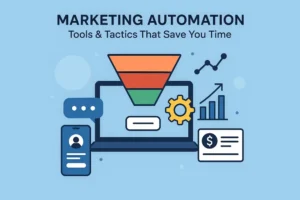In today’s digital age, small businesses are no longer confined by their size or location. The internet has leveled the playing field, allowing even the smallest enterprises to compete with industry giants. However, navigating the vast and ever-evolving digital landscape can be daunting. To thrive, small businesses must employ effective digital marketing strategies that not only boost visibility but also engage and convert potential customers. Here, we explore the top digital marketing strategies that can propel small businesses to success.
Table of Contents
Toggle
Schedule a Consultation Now
1. Search Engine Optimization (SEO): The Foundation of Online Visibility
Search Engine Optimization (SEO) is the bedrock of any successful digital marketing strategy. It involves optimizing your website to rank higher in search engine results, making it easier for potential customers to find you. But SEO is not just about stuffing your site with keywords; it’s about creating quality content, improving site speed, and ensuring a seamless user experience.
SEO can be broken down into two main categories: on-page and off-page. On-page SEO involves optimizing the content on your website, including using relevant keywords, creating meta tags, and ensuring your site is mobile-friendly. Off-page SEO, on the other hand, focuses on building backlinks from reputable websites to increase your site’s authority.
For small businesses, local SEO is particularly important. By optimizing your Google My Business profile and using location-specific keywords, you can attract customers in your area who are searching for the products or services you offer.
2. Content Marketing: The Art of Storytelling
Content marketing is more than just writing blog posts; it’s about telling your brand’s story and providing value to your audience. By creating high-quality content, such as articles, videos, infographics, and podcasts, you can establish your brand as an authority in your industry and build trust with your audience.
A well-executed content marketing strategy can help small businesses generate leads, increase website traffic, and boost conversions. The key is to create content that resonates with your target audience. Understand their pain points, interests, and preferences, and tailor your content to meet their needs.
For instance, if you run a small bakery, you might create blog posts with baking tips, share recipes on social media, or produce a video series on cake decorating. This not only engages your audience but also positions your business as a go-to resource in your niche.
3. Social Media Marketing: Building a Community Around Your Brand
Social media is a powerful tool for small businesses, allowing you to connect with your audience on a personal level. Platforms like Facebook, Instagram, Twitter, and LinkedIn offer opportunities to engage with customers, promote your products, and build brand awareness.
However, effective social media marketing goes beyond simply posting updates. It’s about creating meaningful interactions with your audience. Respond to comments, participate in discussions, and use social media to tell your brand’s story.
One of the key benefits of social media is the ability to target specific demographics through paid advertising. For small businesses with limited budgets, social media ads offer a cost-effective way to reach potential customers. By creating targeted ads based on location, age, interests, and behaviors, you can ensure your marketing dollars are spent wisely.
4. Email Marketing: A Personalized Approach to Customer Engagement
Despite the rise of social media, email marketing remains one of the most effective digital marketing strategies for small businesses. With an average ROI of 4,200%, email marketing allows you to communicate directly with your customers, build relationships, and drive sales.
The key to successful email marketing is personalization. Segment your email list based on customer behavior, preferences, and purchase history, and tailor your messages accordingly. Whether you’re sending a newsletter, promoting a sale, or offering exclusive content, personalized emails are more likely to be opened and acted upon.
Automation tools can help small businesses manage their email marketing campaigns more efficiently. By setting up automated workflows, you can send timely and relevant emails to your subscribers without having to manually intervene.
5. Pay-Per-Click (PPC) Advertising: Driving Immediate Results
For small businesses looking for quick results, Pay-Per-Click (PPC) advertising is an excellent option. PPC allows you to bid on keywords and display ads to users searching for those terms. You only pay when someone clicks on your ad, making it a cost-effective way to drive traffic to your website.
Google Ads is the most popular PPC platform, but there are other options, such as Bing Ads and social media platforms like Facebook and LinkedIn. The key to a successful PPC campaign is choosing the right keywords, creating compelling ad copy, and optimizing your landing pages to ensure conversions.
PPC can be particularly beneficial for small businesses with limited budgets, as it allows you to set a daily or monthly spending cap. Additionally, PPC campaigns can be easily tracked and adjusted in real-time, giving you full control over your marketing spend.
6. Influencer Marketing: Leveraging Trust and Credibility
Influencer marketing has become increasingly popular in recent years, and for good reason. By partnering with influencers—individuals with a large and engaged following on social media—small businesses can reach a wider audience and build credibility.
When choosing an influencer to work with, it’s important to consider their audience and whether it aligns with your target market. Micro-influencers, who have smaller but highly engaged followings, can be particularly effective for small businesses. They often have a more personal connection with their audience, leading to higher engagement rates.
An effective influencer marketing campaign can include sponsored posts, product reviews, or even collaborations on content creation. The key is to choose influencers who genuinely resonate with your brand and can authentically promote your products or services.
7. Video Marketing: Captivating Your Audience
Video marketing has exploded in popularity, with platforms like YouTube, TikTok, and Instagram Reels dominating the digital landscape. For small businesses, video offers a dynamic way to engage with your audience, showcase your products, and tell your brand’s story.
Whether it’s a product demo, a behind-the-scenes look at your business, or a customer testimonial, videos can capture attention in ways that text and images cannot. Moreover, videos are highly shareable, increasing the chances of your content going viral.
To get started with video marketing, you don’t need a large budget or professional equipment. Many successful videos are shot on smartphones and edited with free or low-cost software. The key is to create authentic, relatable content that speaks to your audience’s needs and interests.
8. Customer Reviews and Testimonials: Building Trust and Credibility
In the digital age, word-of-mouth has taken on a new form—online reviews and testimonials. Positive reviews from satisfied customers can significantly impact a small business’s reputation and influence potential customers’ purchasing decisions.
Encourage your happy customers to leave reviews on platforms like Google, Yelp, and Facebook. Responding to reviews—both positive and negative—shows that you value customer feedback and are committed to providing excellent service.
In addition to online reviews, featuring customer testimonials on your website can build trust with potential customers. Highlighting real experiences from real people adds authenticity to your brand and can persuade visitors to choose your business over competitors.
9. Analytics and Data-Driven Marketing: Measuring Success
No digital marketing strategy is complete without analytics. By tracking key metrics, such as website traffic, conversion rates, and customer engagement, small businesses can gain valuable insights into what’s working and what’s not.
Google Analytics is a powerful tool that provides detailed data on your website’s performance. Social media platforms and email marketing services also offer analytics tools that allow you to monitor the success of your campaigns.
Data-driven marketing enables small businesses to make informed decisions and optimize their strategies for better results. By continually analyzing and adjusting your marketing efforts, you can ensure that you’re getting the most out of your budget.
10. Website Optimization: Enhancing User Experience
Your website is often the first point of contact between your business and potential customers. As such, it’s essential that your site is not only visually appealing but also easy to navigate and optimized for search engines.
Website optimization involves several elements, including responsive design, fast loading times, and clear calls-to-action. Ensure that your website is mobile-friendly, as an increasing number of users are browsing the internet on their smartphones.
Additionally, consider incorporating elements like live chat or chatbots to provide instant customer support. A well-optimized website can enhance the user experience, increase engagement, and ultimately drive conversions.
Let's Build Your Dream Website

Conclusion
Digital marketing offers endless opportunities for small businesses to grow and succeed. By implementing these top strategies—SEO, content marketing, social media marketing, email marketing, PPC advertising, influencer marketing, video marketing, customer reviews, analytics, and website optimization—small businesses can build a strong online presence, connect with their target audience, and achieve their business goals.
The key to success lies in understanding your audience, setting clear objectives, and continually analyzing and optimizing your efforts. With the right digital marketing strategies, small businesses can not only survive but thrive in the competitive online marketplace.




